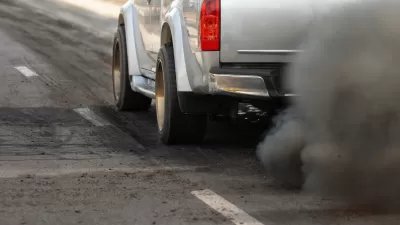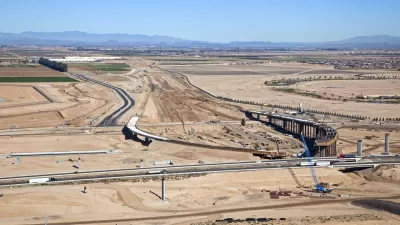A recently proposed rule, the Greenhouse Gas Emissions Measure, would require state and regional planning powers to track and reduce emissions from the U.S. highway system.

The Federal Highway Administration (FHWA) in July proposed a new rule that would require state departments of transportation (DOTs) and metropolitan planning organizations (MPOs) to measure and reduce greenhouse gas emissions created by the National Highway System (both interstate freeways and U.S. highways).
The Greenhouse Gas Emissions Measure (GGEM), as the proposed rule is called, would not mandate specific targets for reductions. “Rather, State DOTs and MPOs would have flexibility to set targets that are appropriate for their communities and that work for their respective climate change and other policy priorities, as long as the targets would reduce emissions over time,” according to Notice of Proposed Rulemaking on the Federal Register.
Transportation for America has written a blog post in partnership with Evergreen Action to support the proposed rule (“a critical tool to foster accountability and steer infrastructure investments toward better climate outcomes”) and provide recommendations for how the Biden administration states can maximize the potential of their emissions reduction efforts. The recommendations, with more details included at the source article, are as follows:
- The Biden administration must finalize a strong performance measure rule ASAP
- The Biden administration must finalize a strong performance measure rule ASAP
- States should incorporate performance measures in state policy and go beyond USDOT’s proposal
- States should incorporate performance measures in state policy and go beyond USDOT’s proposal
The FHWA will receive comments on the proposed GGEM until October 13, 2022.
FULL STORY: Four ways states and the Biden administration can curb transportation pollution

Alabama: Trump Terminates Settlements for Black Communities Harmed By Raw Sewage
Trump deemed the landmark civil rights agreement “illegal DEI and environmental justice policy.”

Planetizen Federal Action Tracker
A weekly monitor of how Trump’s orders and actions are impacting planners and planning in America.

Why Should We Subsidize Public Transportation?
Many public transit agencies face financial stress due to rising costs, declining fare revenue, and declining subsidies. Transit advocates must provide a strong business case for increasing public transit funding.

Understanding Road Diets
An explainer from Momentum highlights the advantages of reducing vehicle lanes in favor of more bike, transit, and pedestrian infrastructure.

New California Law Regulates Warehouse Pollution
A new law tightens building and emissions regulations for large distribution warehouses to mitigate air pollution and traffic in surrounding communities.

Phoenix Announces Opening Date for Light Rail Extension
The South Central extension will connect South Phoenix to downtown and other major hubs starting on June 7.
Urban Design for Planners 1: Software Tools
This six-course series explores essential urban design concepts using open source software and equips planners with the tools they need to participate fully in the urban design process.
Planning for Universal Design
Learn the tools for implementing Universal Design in planning regulations.
Caltrans
Smith Gee Studio
Institute for Housing and Urban Development Studies (IHS)
City of Grandview
Harvard GSD Executive Education
Toledo-Lucas County Plan Commissions
Salt Lake City
NYU Wagner Graduate School of Public Service




























